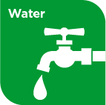Water

Water is essential to life. We use it for drinking, washing, farming, manufacturing, and more. But clean, fresh water is limited and under threat.
Why Water Matters
-
Only 2% of the world’s water is fresh water.
-
Pollution from sewage and chemicals is making clean water harder to access.
-
Demand is rising, but the natural water cycle can’t keep up.
Water Use & Waste
-
A shower saves enough water each week to make 1,000 cups of tea.
-
A garden sprinkler uses as much water in 30 mins as a family of four does in a whole day.
Water itself is free—but we pay for cleaning, treating, and delivering it. The more we waste or pollute it, the more expensive it becomes.

Water in Schools
-
Schools in the UK spend around £106 million annually on water.
-
A large post-primary school can spend up to £20,000 a year.
-
Careful water management can cut water use by two-thirds, saving up to £5,000 per year.
Learning About Water Justice
Explore the global impact of water issues with resources from Trócaire:
Madzi Water Justice Game: Experience life in Malawi and how climate change affects water supply—droughts, floods, and food shortages. Download the teacher guide here.
Water Justice Tree: Interactive digital platform with videos, animations, and activities exploring water, climate change, and social justice.
Take Action
-
Add water reduction goals to your Eco-Schools Action Plan.
-
Explore Case Studies for inspiration.
-
Visit the Partners section to find organisations that can help your school reduce water use.
